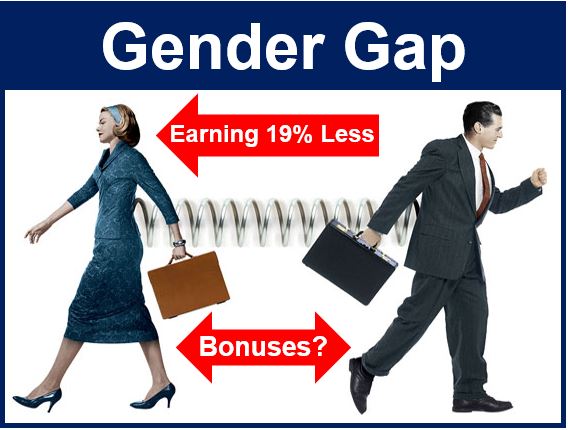Proposed legislation aimed at reducing the gender gap in pay will require that larger employers report how much they paid to men and women in bonuses. The proposed regulations will apply to firms in England, Wales and Scotland with over 250 workers.
The new transparency rules will cover over 10 million British workers. The number that receive bonuses is much smaller. The measures are contained in the Equality Act 2010, which the Labour government introduced and the Tories blocked, until now.
This is the first step, aimed at concentrating minds, said Nicky Morgan, Women and Equalities Minister.
 “A gender-equal society would be one where the word ‘gender’ does not exist: where everyone can be themselves.” (Gloria Steinem – recognized in the 60s and 70s as spokeswoman for the feminist movement.)
“A gender-equal society would be one where the word ‘gender’ does not exist: where everyone can be themselves.” (Gloria Steinem – recognized in the 60s and 70s as spokeswoman for the feminist movement.)
Failing companies should be fined, says TUC
The TUC (Trades Union Congress), the federation of trade unions in England and Wales, said the new law should include medium-sized companies. It added that businesses that do not comply should be fined.
The proposal is the first of several equality-boosting measures which will be set out in detail later this week. Lawmakers hope new legislation will be introduced during the first months of 2016, according to Downing Street.
The proposed legislation will include both public and private sector employers, as well as the voluntary sector.
There is also a target to include women on the board of directors of Britain’s 350 biggest companies, after meeting the target of having women in at least one quarter of boardroom seats in FTSE 100 companies.
Gender gap wider among older workers
According to latest studies, overall women earn 19% less than men in the United Kingdom. The smallest difference is among male and female workers younger than 40 years of age.
The gap is still large among workers aged 40+, after women have taken time out to raise their children and work part time.
Frances O’Grady, TUC General Secretary, who described the latest proposed measure as a start, said we need to find out why employers pay women less than men, and “do something meaningful about it.”
Ms. O’Grady added:
“If the Prime Minister is serious about ending the gender pay gap within a generation he must not delay mandatory pay gap reporting and he should extend the law to medium-size companies as well as large employers. And companies that don’t comply with the law should be fined.”
“If the government really wants to help women workers, it should also stop cutting tax credits and public services that make up a vital part of women’s income.”
“It is shocking the UK still has such a large gender pay gap 45 years after the Equal Pay Act and I would urge all women concerned about their pay to join their union, to get their voice heard and their interests represented at work.”
In an interview during the BBC’s Andrew Marr Show, Ms. Morgan said:
“(The Government is) going further than ever before to ensure true gender equality in the workplace. When companies see the gender pay gap in their own company, of their employees, including bonuses, that does start to change behaviours; it [starts] the conversations in the company.”
Prime Minister David Cameron addressed the issue of men’s and women’s pay at the Conservative conference, saying his own daughters could face gender discrimination over pay.
www.gov.uk quoted Mr. Cameron, who also said:
“You can’t have true opportunity without equality. There is no place for a pay gap in today’s society and we are delivering on our promises to address it.”
www.gov.uk also quoted Ann Francke, Chief Executive Officer of the Chartered Management Institute, who said:
“One of the biggest drivers of gender pay discrepancy, especially at senior levels, is the bonus gap. Bonuses are also where gender bias can creep in easily as they are amongst the least transparent forms of pay.”
“There’s a tendency to reward those in our own image or to think that because men may be the ‘main breadwinners’ they deserve higher bonuses. And men often negotiate harder or trumpet their achievements more readily.”
“The government’s new reporting legislation is a welcome step forward and will be good news for business. Clearer employee data, improved recruitment and a reinvigorated focus on business culture will help unblock the talent pipeline and support more women to become senior managers and leaders.”
Video – Income Inequality
Income inequality highlights the difference between the highest, middle, and lowest earners in the world, a country, or region. The term includes the pay gap between genders, ethnic, racial, and academic groups.

